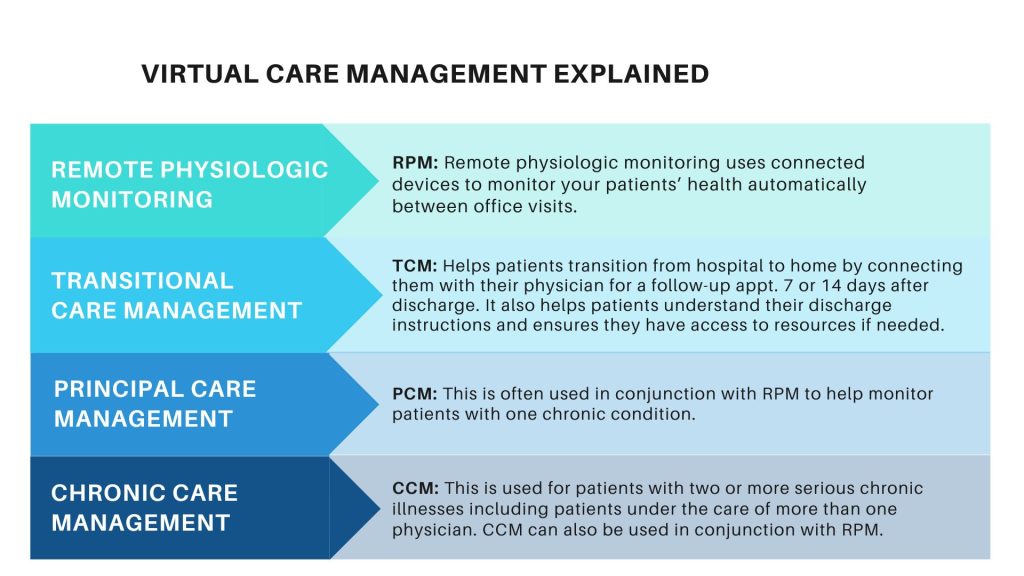


If you are confused these days about all of the Remote Physiologic Monitoring (RPM) terms being tossed around because it seems like a big bowl of Alphabet Soup…you are not alone! These various abbreviations all fall under the umbrella of Virtual Care Management (VCM) – a care program that utilizes a robust electronic digital platform and certified technicians and/or nurses to facilitate personalized interactions with patients, and employs remote monitoring devices that are in the patients’ homes.
With an aging “Boomer” patient population over the next twenty years and more young people desiring their healthcare issues be done as much as possible from their homes, physicians need to adapt to this new way of communicating, monitoring, and following up with patients.
It is estimated that approximately 30 million people in the US will be using RPM tools and devices by 2024,1 which will improve patient outcomes, lower readmissions to hospitals, and cut overall costs, while adding revenue to many practices. And by 2025, some estimates put RPM usage at over 26% of the entire US Population. Therefore, where VCM was once something to be “considered”, it is now clearly becoming a necessity.
To clear up any confusion about the various types of Virtual Care Management services, the chart below explains the differences in an easy-to-understand format.

The confusion often lies in the main differences between PCM and CCM, and how different physicians can manage the billing for the allowable remote patient monitoring services.
PCM can be offered when a patient has only a single high-risk chronic disease and requires that a clinical staff member spend a minimum of 30-minutes per calendar month reviewing and interpreting data, and communicating with the patient about their care plans as well as relaying information or a report to the physician.
CCM can be offered for patients with multiple chronic diseases, including patients under the care of more than one physician…such as a cardiologist and a nephrologist. CCM allows for an ongoing relationship with a single care team that is cognizant of all of the patient’s various conditions and is billable for time spent managing these various conditions. Reimbursable coverage for CCM services includes interacting remotely with the patient to communicate and manage medication dosing, advise about use of digital devices such as B/P cuff or weight scale, mostly by phone, and coordinating the care of the patient between various providers.
Industry reports, including the Centers for Medicare and Medicaid Services (CMS),2 are showing that with more and more healthcare being provided at home, an aging patient population, and doctors’ practices becoming overwhelmed – too many patients to see, not enough staff or hours to handle all the visits – there is the potential for between $250-$400 billion in services to be delivered virtually in the next few years.3 The Remote Patient Monitoring (RPM) Market is expected to project a significant CAGR of 38.6% in 2030.4
The issue is that in a busy Cardiac Clinic, or active Physician’s Practice, with a limited staff and expanding workflow, many Physicians are unable, due to time constraints, to review the amount of data produced by their patients’ mobile devices – let alone understand how to properly bill for time spent reviewing the data and communicating with the patient. What can happen is patient monitoring reports with alerts may fall to the bottom of the Physician’s or Practice Manager’s paperwork. Sometimes these reports are not reviewed for days or even weeks, leaving the patient without any action being taken to advise them of a medication change or the need for an office visit, potentially leading to more serious illness, complications, and even possible hospital admissions and readmissions.
Cardiac RMS can step in and facilitate a Virtual Care Management program for your practice. Our trained and experienced care managers and Patient Engagement Specialists empower patients to feel connected to their caregivers and stay compliant between office visits. They take an empathetic approach when connecting with patients personally, resulting in increased patient compliance and satisfaction.
And only actionable data is delivered to the patients’ providers so that plan of care decisions can be made with the most relevant information.
If you are interested in having a conversation to see how Cardiac RMS can help you manage your patient population with our Virtual Care Management services, reach out to us and set up an appointment with one of our team members at https://cardiacrms.com/contact-us/. We can discuss the benefits to your practice of using our VCM services, how we can help with your office workflow, handle all of the reimbursable billing, communicate with your patients, and demonstrate how your patients will be more compliant and have better outcomes.
1 https://www.insiderintelligence.com/insights/remote-patient-monitoring-industry-explained/

Copyright © 2024 Cardiac RMS. All rights reserved.
Visually impaired? Contact us at 844-GET-CRMS for assistance.
Cardiac RMS LLC is a clinical service partner with expertise in remote monitoring of patients who have a cardiac pacemaker, implantable cardiac defibrillator, implantable heart failure device, or implantable loop recorder. Services also include Virtual Care Management, utilizing Remote Physiologic Monitoring (RPM) and care management to remotely support the treatment of patients with chronic conditions.